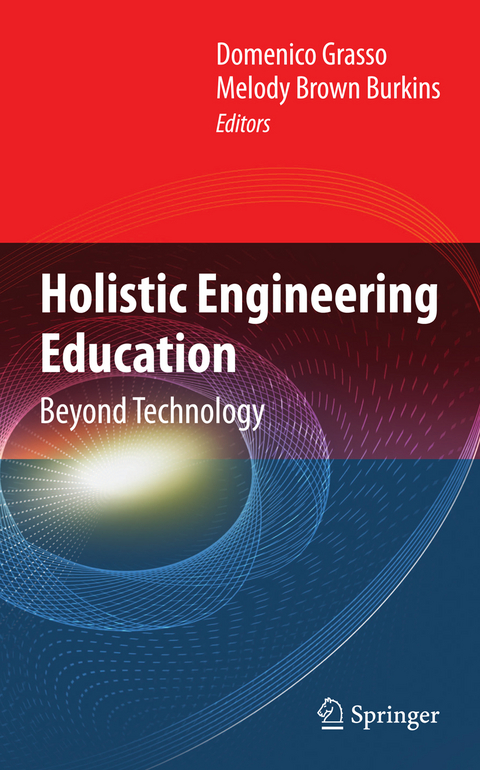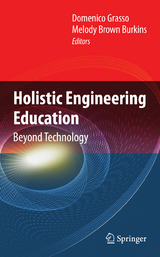Holistic Engineering Education
Springer-Verlag New York Inc.
978-1-4419-1392-0 (ISBN)
Holistic Engineering Education: Beyond Technology is a compilation of coordinated and focused essays from world leaders in the engineering profession who are dedicated to a transformation of engineering education and practice. The contributors define a new and holistic approach to education and practice that captures the creativity, interdisciplinarity, complexity, and adaptability required for the profession to grow and truly serve global needs. With few exceptions today, engineering students and professionals continue to receive a traditional, technically-based education and training using curriculum models developed for early 20th century manufacturing and machining. While this educational paradigm has served engineering well, helping engineers create awe-inspiring machines and technologies for society, the coursework and expectations of most engineering programs eschew breadth and intellectual exploration to focus on consistent technological precision and study. Why this dichotomy?
While engineering will always need precise technological skill, the 21st century innovation economy demands a new professional perspective that recognizes the value of complex systems thinking, cross-disciplinary collaborations, economic and environmental impacts (sustainability), and effective communication to global and community leaders, thus enabling engineers to consider "the whole patient" of society's needs. The goal of this book is to inspire, lead, and guide this critically needed transformation of engineering education.
"Holistic Engineering Education: Beyond Technology points the way to a transformation of engineering education and practice that will be sufficiently robust, flexible, and systems-oriented to meet the grand challenges of the 21st century with their ever-increasing scale, complexity, and transdisciplinary nature."
-- Charles Vest, President, National Academy of Engineering; President Emeritus, MIT
"This collection of essays provides compelling arguments for the need of an engineering education that prepares engineers for the problems of the 21st century. Following the National Academy’s report on the Engineer of 2020, this book brings together experts who make the case for an engineering profession that looks beyond developing just cool technologies and more into creating solutions that can address important problems to benefit real people."
-- Linda Katehi, Chancellor, University of California at Davis
"This superb volume offers a provocative portrait of the exciting future of engineering education…A dramatically new form of engineering education is needed that recognizes this field as a liberal art, as a profession that combines equal parts technical rigor and creative design…The authors challenge the next generation to engineering educators to imagine, think and act in new ways. "
-- Lee S. Shulman, President Emeritus, The Carnegie Foundation for the Advancement of Teaching and Charles E. Ducommun Professor of Education Emeritus, Stanford University
FOREWORDS:
C. Judson King, Provost and Senior Vice President – Academic Affairs, Emeritus; Director, Center for Studies in Higher Education; Professor of Chemical Engineering, Emeritus; University of California-Berkeley.
Rick Miller, President, Franklin W. Olin College of Engineering.
Maria Klawe, President, Harvey Mudd College.-
Beyond Technology: The Holisitic Advantage: Domenico Grasso, Vice President for Research and Dean of the Graduate College, College of Engineering and Mathematical Sciences, The University of Vermont; Melody Brown Burkins, Senior Director for Research and Strategic Initiatives, The University of Vermont.-
Holistic Engineering: Domenico Grasso and David Martinelli, Chairman, Department of Civil and Environmental Engineering, West Virginia University.-
Engineering for a Changing World: A Roadmap to the Future of American Engineering Practice, Research, and Education: James J. Duderstadt, President Emeritus and University Professor of Science and Engineering, The University of Michigan.-
K-12 Engineering; The Missing Core Discipline: Ioannis Miaoulis, President and Director, Museum of Science, Boston.-
Liberal Arts and Engineering: Catherine P. Koshland, Vice Provost, Academic Planning & Facilities; Wood-Calvert Professor in Engineering, University of California-Berkeley.-
What Is Happening In Liberal Education?: Carol T. Christ, President, Smith College.-
Holistic Engineering and Educational Reform: Domenico Grasso and Joseph J. Helble, Dean and Professor of Engineering, Thayer School of Engineering, Dartmouth College.-
Beyond Systems Engineering – Educational Approaches for the 21st Century: Priscilla Guthrie, Associate Director of National Intelligence and Intelligence Community Chief Information Officer, Office of Director of National Intelligence.-
The Education of an Engineer in a Holistic Age: A Latin American Perspective: Hector Gallegos, President of the Peruvian College of Engineering.-
On the Cultivation of Innovative Engineering Talent: Pan Yunhe, Vice President, Chinese Academy of Engineering.-
International Education and Holistic Thinking for Engineers: Dennis D. Berkey, President, Worcester Polytechnic Institute.-
Engineering Value Propositions: Professional and Personal Needs: Gary E. Wnek and Suzette Williamson, The Institute for Management and Engineering (TiME), Case Western Reserve University.-
The Missing Basics & Other Philosophical Reflections for the Transformation of Engineering Education: David E. Goldberg, Illinois Foundry for Innovation in Engineering Education (iFoundry), University of Illinois at Urbana-Champaign.-
Dispelling the Myths of Holistic Engineering: Domenico Grasso, Melody Brown Burkins, Joseph Helble, and David Martinelli.-
The Practice of Systems Engineering: A Foundation for Technical Leadership: Dr. Wanda Austin, et al, The Aerospace Corporation.-
Holistic Systems Integration: Al Grasso et al, President & CEO, MITRE Corporation.-
Engineers of Tomorrow: Holistic-Thinking System Engineers: Charla K. Wise, Vice President - Program Excellence and Operations, Energy and Security Services, Lockheed Martin.-
Collaborative Innovation and Service Systems: Implications for Institutions and Disciplines: Nicholas Donofrio, Executive Vice President, IBM.-
Technology and Policy: M. Granger Morgan, Head, Department of Engineering and Public Policy, Carnegie-Mellon University.-
From the reviews:
“This compilation of 19 essays by different authors (mostly academics and a few from industry) adds to the ever-expanding volume of literature that is critical of the standard technical-intensive engineering education. … The work is best suited for those in higher education concerned with the revision of engineering curricula. Summing Up: Recommended. Academic libraries serving researchers and faculty.” (R. Darby, Choice, Vol. 47 (10), June, 2010)
| Zusatzinfo | XX, 301 p. |
|---|---|
| Verlagsort | New York, NY |
| Sprache | englisch |
| Maße | 155 x 235 mm |
| Themenwelt | Mathematik / Informatik ► Informatik ► Theorie / Studium |
| Naturwissenschaften ► Physik / Astronomie ► Thermodynamik | |
| Sozialwissenschaften ► Pädagogik | |
| Technik | |
| ISBN-10 | 1-4419-1392-0 / 1441913920 |
| ISBN-13 | 978-1-4419-1392-0 / 9781441913920 |
| Zustand | Neuware |
| Haben Sie eine Frage zum Produkt? |
aus dem Bereich




